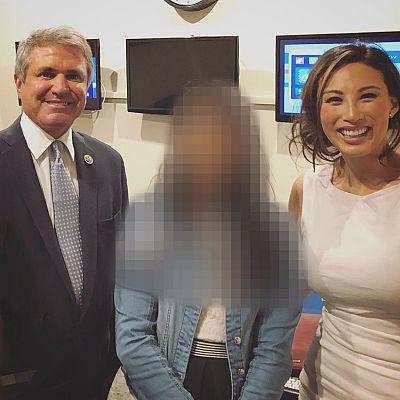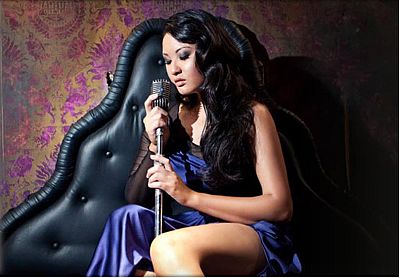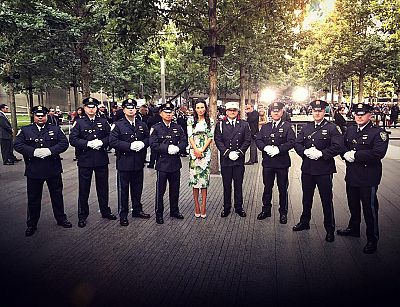Chang, who resigned after NBC News revealed holes in her resume, had ties to two State Department officials and a staffer for Rep. Michael McCaul, R-Texas.
WASHINGTON — Mina Chang figured out how to work the levers in Dallas and in the nation's capital, making connections with key figures and cultivating an online image, until her overblown credentials and claims crumbled under scrutiny.Chang resigned last week from a senior State Department post after an NBC News investigationrevealed she made misleading claims about her charity work and qualifications — including a fake TIME magazine cover with her face on it.Since Chang's resignation, former colleagues, social acquaintances and government officials have reached out to NBC News, providing more information that helps explain how Chang made it as far as she did.After crafting a public image as a humanitarian "thought leader" with help from paid media and public relations consultants, she ingratiated herself with prominent Republicans in Dallas and former military officers, former colleagues said. She often asked those who performed work for her to sign non-disclosure agreements,the former associates told NBC News.To secure her job at the State Department in April, Chang leveraged social connections to senior officials who could help open the doors to the administration, including Brian Bulatao, a close friend and deputy to Secretary of State Mike Pompeo; a State Department official and former defense contractor who she succeeded as deputy assistant secretary, Pete Marocco; and a congressional staffer for key GOP lawmaker Rep. Michael McCaul of Texas, multiple sources told NBC News. Marocco endorsed her for the job and McCaul wrote her a recommendation letter.
A spokesman for Chang said Bulatao did not "have any part in Ms. Chang's appointment within the State Department." The spokesman also said that the State Department vetted her background, approved her security clearance along with the FBI, and signed off on her bio for the department's website. Chang and her spokesman declined to comment on the role played by the McCaul staffer.The State Department and its Diplomatic Security Service, which helps vet appointees, did not respond to requests for comment.By the time Rep. McCaul issued the recommendation letter, Chang's nomination was moving ahead thanks to her own contacts in the administration, said a spokesperson for the congressman, Kaylin Minton.A congressional source said by the time Rep. McCaul issued the recommendation letter, Chang's nomination was moving ahead thanks to her own contacts in the administration.The McCaul staffer "was one of many social connections she had in D.C., and she was well on the way to obtaining a position when the letter was sent" the congressional source said.Marocco declined to comment through a Pentagon spokesperson.On her path to Washington, Chang pushed some tenuous connections too far.In 2015, Chang partnered with the U.S. Military Academy at West Point to host cadets for internships at her nonprofit in Dallas. A former West Point faculty member and a source familiar with the matter told NBC News the program was quickly scrapped, after it became apparent the nonprofit was not doing much work and the interns were sitting in a mostly empty office. That year the organization reported to the IRS that it had only one employee.After hearing concerns from a cadet working as an intern at the nonprofit, the faculty member, who did not want to be identified, looked up the organization's website and concluded the charity was not worthy of a West Point association. He told NBC News, "I realized this is 100 percent bullshit. I said, 'Pull the interns'."After the cadet program collapsed, West Point asked Chang's charity to stop using West Point's logo — and the logo of the academy's Center on Civil and Military Operations — in her materials. She took the material down when requested. When Chang was nominated for an even more senior job at the U.S. Agency for International Development, congressional staffers reviewing her background caught wind of the West Point episode.The U.S. Military Academy's public affairs office declined to comment.Chang did not respond to a request for comment.Friends in high placesAt a 2018 awards dinnerof defense contractors in Washington, D.C., Chang made a point of introducing herself to an official who she eventually would succeed at the State Department as a deputy assistant secretary, said a source who attended the event said. She also befriended a key staffer on the House Homeland Security Committee, leading to a recommendation letter from Rep. McCaul, according to a former staffer and a congressional source.In a Feb. 8, 2018 letter to the White House, Rep. McCaul gave Chang "the strongest recommendation" to serve in a senior leadership position at the State Department, either in the Bureau of Conflict and Stabilization Operations or in the Bureau of Counterterrorism.McCaul cited her experience as a "seasoned field practitioner" and her work in "academia." But she had no track record in academia or published research.McCaul, through a spokesperson, said he now has a different perspective on Chang's qualifications."While Congressman McCaul offered a recommendation letter based on her previous work and advocacy on issues like global fragility and countering violent extremism, it is clear now she was not entirely forthcoming with the State Department and others," said Kaylin Minton, spokesperson for McCaul. "She must accept the full consequences of her actions."
Before receiving the letter of recommendation, Chang was spotted at numerous events, including the 2018 Aspen Security Forum, with McCaul's staffer. She also showed up at a 9/11 commemoration that McCaul attended and had coffee with members of the lawmaker's staff, the sources said.Apart from her Capitol Hill connection, Chang received support from Marocco at the State Department. Marocco helped circulate her resume and vouched for her as she sought out a post at State, three sources familiar with the matter said.Marocco, a retired Marine who served in the service's special operations forces branch, is now at the Pentagon as senior official overseeing Africa affairs.Her start in DallasFifteen years ago Mina Chang lived in Dallas and went by her first name, Sharon, attending a flurry of charity events and making social connections with affluent Republicans and retired military officers working in the defense industry.Locally, she "became very visible, very quickly," said Susan Posnick, who knew her at the time and hired her for six months to be the face of Posnick's makeup company.At the time, Chang had multiple websites promoting her work. There was one for the event production company she started at age 24, another site for her recording career.But her focus soon shifted to presenting herself as a passionate humanitarian. Her bio from 2013 read: "Her desire to alleviate suffering and inspire hope and joy around the world motivated her to retire from the music industry in order to work full time with disaster response teams and Linking the World."Her charity's website featured pictures of Chang in war-torn places with unnamed children.Before she resigned last week and took it down, her Facebook account had 77,000 followers. Her Instagram account, which has 44,000 followers, was filled with pictures of her with big names in national security and politics like former CIA director and Defense Secretary Robert Gates, retired Gen. David Petraeus and former President George W. Bush's adviser Karl Rove. At one point in April 14, 2016, she posted more than 70 Instagram pictures in a single day.
Chang hired a succession of public relations consultants to help craft a convincing picture for her non-governmental organization, Linking the World, even though there was not much to go on."It was like trying to weave a narrative out of whole cloth," said someone familiar with Chang's non-profit.In a 2015 speech, Chang said, "[W]e have in-house canine search and rescue teams." When asked about her comments, her former chief of staff, Ian Dailey, said the charity had one dog "onboarded" but the dog was "diagnosed with seizures" and "retired." The organization then chose to "cease development of the effort."Her website conveyed dynamic activity and on-the-ground aid operations, even though the reality often had Chang traveling to a location on trips paid for by defense contractors, former colleagues said.An old friend who knew her in Dallas and did not want to be named said, "It's like Leonardo DiCaprio in that movie 'Catch Me If You Can,' I've been saying that for years," she said. "She spent almost two decades building herself out of thin air."Unlike the path that other humanitarians typically follow, Chang pursued connections with military contractors. She showed up at international conferences, including a 2015 event in the German city of Stuttgart with defense contractors that carry out work in Africa. The "host" for her charity's dinner on May 2, 2016 in Dallas was AlliedBarton Security Services, a large government security contractor that pledged $10,000 to the organization, according to a press release.Chang's trips to conflict areas in Afghanistan and Iraq were paid for by the defense contractor AMS. At least one trip that yielded pictures of Chang in war-torn Kurdish areas was coordinated by the U.S.-Kurdistan Business Council, according to AMS company documents.Looking credibleWithout any university degrees or work in the policy world, Chang sought out seminars and organizations that would allow her to associate herself with prestigious institutions and convey an aura of credibility and expertise. Some required paying a steep fee. She attended Harvard Business School's Advanced Management Program, which "has no formal education requirements" and charges applicants $82,000 for a seven-week course.The program permits people who have finished the program to call themselves alumni, and creates an opportunity for them to tap into the Harvard alumni network. When Chang was mentioned as a possible candidate for ambassador to the Philippines in local media in Manila, newspapers wrote incorrectly that she was a "Harvard graduate." The U.S. embassy in the Philippines at the time dismissed the rumor as inaccurate.Chang touted her membership in the Young Entrepreneurs Club and the Forbes Nonprofit Council. Both groups bestow membership through fees, according to Scott Gerber, the CEO of the Community Company, who manages both organizations.Chang also paid to be a member of Ellevate, a women's networking group, which helped Chang place articles promoting herself and her charity in Forbes and the Huffington Post, according to its marketing coordinator, Nazli Tamer.A fake TIME magazine cover with her face on it added credibility to her bio for at least some people who found it online. One House staffer who met her in Washington found the TIME cover when Googling Chang's name and assumed it was real, "That made me think she was legit," the former staffer said. The cover is "not authentic," said a spokesperson for the magazine.Chang has denied having any role in creating the magazine cover and her spokesperson said an "enthusiastic fan" created the picture and circulated it online.She eventually got a foothold in Washington as a fellow with the New America think tank. While not a paid position, the fellowship provided her a credible platform and a title that could be listed on her resume and open more doors. The organization recently removed Chang's bio from its website noting, "The content of this page has been deleted due to questions raised about its accuracy."Chang also had a tendency to claim or imply credit for work done by others, former colleagues said.Today, Chang's colleague Ian Dailey says the Dallas charity was spawned from a Korean international relief organization that worked in 40 countries and started in 1998. But in Chang's numerous public speeches she did not mention the Korean organization, saying instead that she was CEO of an "international relief organization" based out of Dallas that works in 40 countries. She told an audience in 2014 that she worked with world leaders, saying, "Linking the World provides hunger relief medical aid, we have operated schools, we have built schools in places like Afghanistan, Myanmar, Kenya, Haiti."
In another speech in 2015 she told the story of a courageous woman in Myanmar, adding, "We hired her to set up a mobile library in Myanmar." That same year she told another group, "We've responded to major disasters, the typhoon in the Philippines, earthquake in Nepal, Ebola in West Africa, we did all these things…"But according to the IRS, Chang's charity only submitted one tax filing and that was in 2015. In that document the organization was asked, "Did the organization maintain an office, employees or agents outside the United States?" The charity responded, "No."The organization's tax-exempt status was revoked by the IRS earlier this year.Dailey said the organization did submit its tax forms but that the IRS could not locate them. He said he has resubmitted the forms and expects the "administrative issue" to be resolved soon.Non-disclosure agreementsDetails about Chang's non-profit and how it operated remain unclear partly because at least three former contacts told NBC News they could not speak due to non-disclosure agreements they were required to sign. Those included a former intern and a former senior development adviser for Linking the World, Michael Baker.Another NDA was signed by a freelance journalist, Natalie Keyssar, who was planning to accompany Chang on a 2015 trip to Afghanistan that was sponsored by the defense contractor AMS. She did not end up going on the trip."I signed an NDA regarding all conversations," she told NBC News.Chang lists just $12,000 in income before she took the State Department job and listed no salary from her charity. According to papers from her divorce case in 2011, she was due to receive nearly $1,400 a month in child support and $500 in alimony per month for a year from her ex-husband, a real estate developer. She lived in an affluent neighborhood in Dallas in a high-end apartment building, former colleagues and acquaintances said.Chang, however, had links to businesses outside of her NGO, according to her charity's website and Texas public records. In addition to her event production company, she publicly claimed a connection to Vissero Partners LLC, a company that sought investments from wealthy foreign nationals who invest at least $250,000 in U.S.-based projects in exchange for visas through the federal EB-5 program.While Chang was listed in public records as a "managing member" of another company called "Concinnity Management," she failed to disclose that on a financial disclosure form filed in 2018 to the U.S. Office of Government Ethics.Susan Posnick and other people who came into contact with Chang over the years said they had lingering suspicions about how she promoted and presented herself, and wondered when things would catch up with her. "I'm someone who gives someone the benefit of the doubt but everyone around me was questioning it," Posnick said. "It's just insane she got as far as she did."In a statement, Chang colleague Dailey said, "Throughout this process I have provided honest answers that have only partially been utilized, or ignored entirely. NBC has destroyed a good woman's reputation, and an organization's good works. I will no longer participate in this grievous misrepresentation, where the truth is discarded for spin. If you choose to retract allegations that are patently false, e.g. that she made up a [UN] panel, wasn't entitled to call herself an alumna of HBS, or actively brought a picture to an interview, then, perhaps, I'll consider participating in a fair process."















